#SDG6
Text
Thematic Report to the 79th session of the United Nations General Assembly “Water and food nexus: a human rights approach to water management in food systems”.
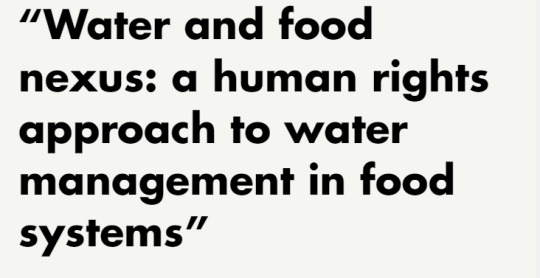
The Special Rapporteur on the human rights to safe drinking water and sanitation, Pedro Arrojo Agudo, is inviting inputs from States and other stakeholders to inform his thematic report on “Water and food nexus: a human rights approach to water management in food systems”. The report will be presented at the United Nations General Assembly's 79th session in October 2024.
The Special Rapporteur on the human rights to safe drinking water and sanitation understands that the dominant systems of large-scale food production and comercialication are harming the human rights to safe drinking water and sanitation worldwide. For the Special Rapporteur, under the argument of producing more and more food for a growing world population, the right to food is often used as an argument to justify unsustainable water management, overusing water sources and affecting aquatic systems, resulting in contamination or scarcity of water needed for human use. As reflected in Special Rapporteur´s report A/HRC/54/32 of 2023, guaranteeing the human right to water for the most impoverished requires restoring the good state of the aquatic ecosystems on which they depend for their water supply. In addition, over-exploitation and pollution of aquatic ecosystems often undermine small-scale food production for self-consumption in impoverished rural communities.
In this connection, the Special Rapporteur would like to call member states, non-state actors, civil society, academia, indigenous peoples, individuals, and other relevant stakeholders to send their contributions and experiences related to the sustainability of aquatic ecosystems and freshwater sources and the systems used to produced food. The Special Rapporteur would appreciate receiving inputs on the interlinkages between both rights and the positive and negative experiences on sustainable (or unsustainable) use of water sources by food systems, including court rulings at global, regional, national, and local levels.
The Special Rapporteur wishes to thank States, indigenous peoples, civil society organisations, academic institutions, businesses, international organisations, individuals, and other stakeholders for their continued engagement with this mandate.
Key information sought: To facilitate the reception of inputs, the Special Rapporteur prepared a list of key information which he considers essential for the report. The list could be answered entirely or partially according to the expertise and experience of those actors willing to contribute to the Report. List of topics: English | Français | Español
How inputs will be used
All submissions will be published on the website of the mandate. Non-state actors could request the confidentiality of the submission.
Next Steps
Please send your contributions via email, indicating “Input Water and Food Nexus” in the email subject line. Your contribution should be sent by no later than 15 March 2024
Email address: [email protected] AND to [email protected].
Email subject line: Input water and food nexus
Word limit: 2500 words
File formats: Word, PDF
Accepted languages: English, Spanish, French
#Special Rapporteur on the rights to water and sanitation#sdg6#water resources#water governance#human rights approach#call for imputs#safe drinking water#OHCHR#Water and Food Nexus#UNGA79#water management#water goals#member states#non-state actors#civil society#academia#indigenous peoples#individuals#stakeholders
16 notes
·
View notes
Text

Sustainable Development Goals SDG
3 notes
·
View notes
Text
Btw, it's World Water Day today. I'll show you the posters we made this year.

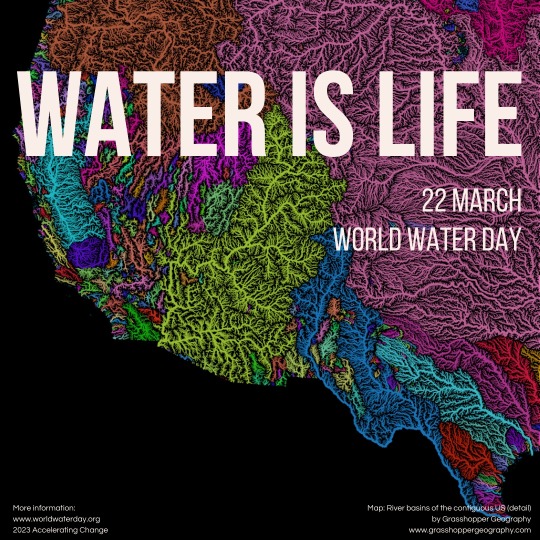

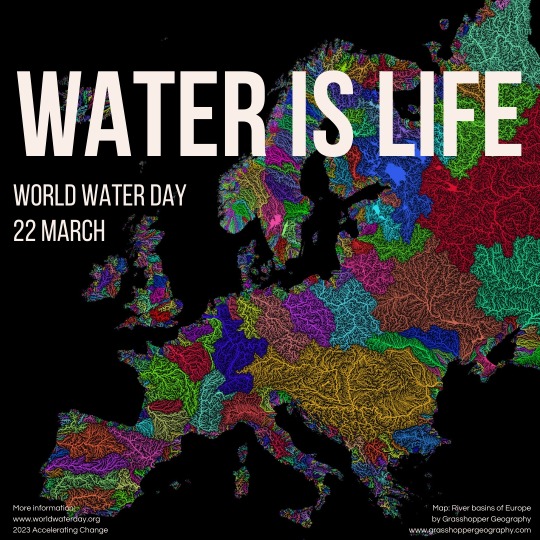
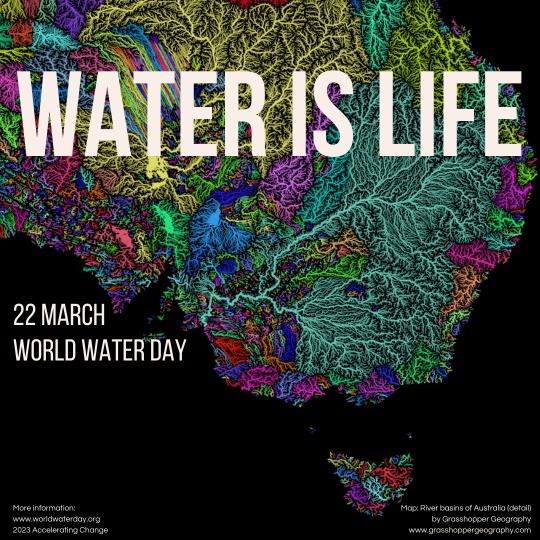
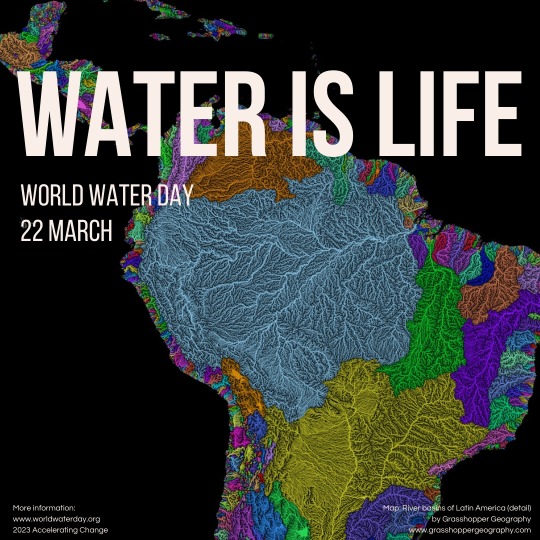
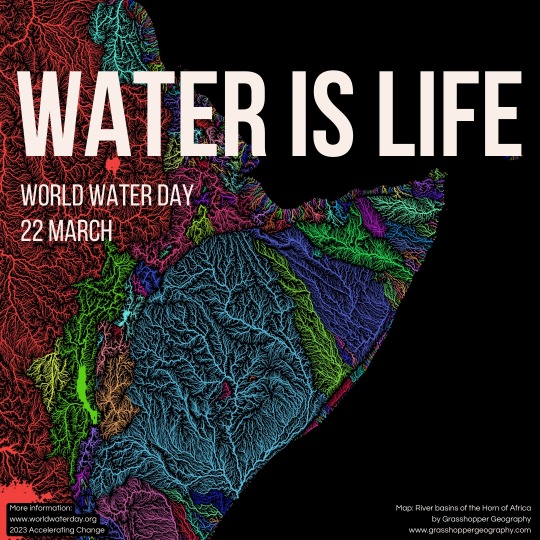

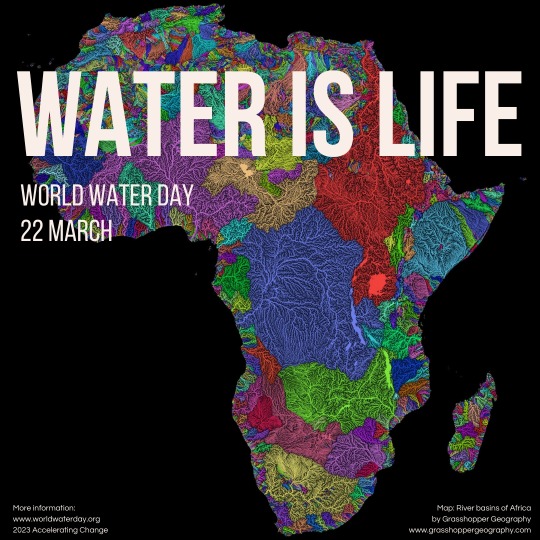
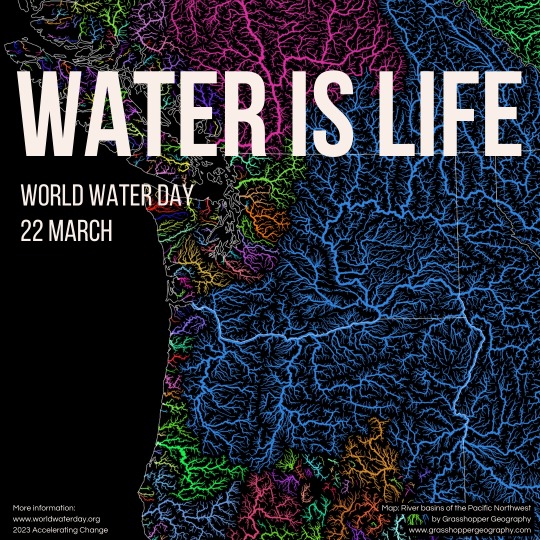
You are free to share these of course :) I might post some of them separately later today.
Find them all in better quality here.
And a few words about World Water Day for those who'd like to know more:
World Water Day, held on 22 March every year since 1993, focuses on the importance of freshwater. It celebrates water and raises awareness of the 2.2 billion people living without access to safe water. It is about taking action to tackle the global water crisis. A core focus of World Water Day is to support the achievement of Sustainable Development Goal 6: water and sanitation for all by 2030.
Right now, we are seriously off-track to meet SDG6. Billions of people and countless schools, businesses, healthcare centres, farms and factories don’t have the safe water and toilets they need. To accelerate change, we need more action. Learn about how through stories from around the world. You can also take action by following the steps of The Lazy Person's Guide to Saving the World or get some inspiration from the UN's Act Now site.
The more people talk about these global issues, the more action will be taken - on personal and on governmental level as well. This year we decided to contribute to the campaign with these posters you are free (and encouraged) to share on social media. Give people the chance to talk about the importance of freshwater.
#world water day#world water day 2023#rivers#watersheds#maps#river basins#water is life#water crisis#water agenda#sdg6#act now
7 notes
·
View notes
Text
Bringing Renewable Energy to Local Farmers.
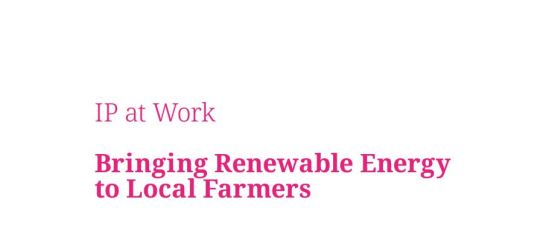
Eco-innovative farming solutions are vital to ensuring the
global reduction of greenhouse gas (GHG) emissions related to
agriculture. Biodôme du Maroc, a small, fast-growing Moroccan
company, provides local farmers with a technology that gives
them access to renewable energy for on-farm use.
Founded in 2013 by Dr. Fatima Zahra Beraich, Biodôme du Maroc
is the first Moroccan company to specialize in the recovery of
organic waste through natural treatment and environmentally
friendly processes. This is to enable farmers in rural areas to
produce biogas and fertilizer.

For the environment, biogas helps to reduce greenhouse gas
emissions from abandoned organic waste and minimizes the risk
of polluting waterways. This “clean” method of energy production
also reduces reliance on wood as a fuel source.
Biodôme du Maroc offers a range of small-scale agricultural
anaerobic digesters. These digesters use a simple and innovative
system to produce biogas and recover organic matter. Inside
underground concrete enclosures, farmers can deposit different
kinds of organic waste, such as household, plant and animal waste,
which is fermented in a biological accelerator. In this process, gas
is produced through methanization or anaerobic bio-digestion,
where bacteria naturally break down organic matter within weeks.

By providing a technology that produces gas from organic waste, Biodôme du Maroc gives local farmers access to renewable energy for agricultural production.
Dr. Beraich currently holds six patents covering innovations that
improve the efficiency and performance of Biodômeʼs bio-digesters.
“The process of securing a patent means that our technology
is evaluated by experts and allows us to understand just how
different our inventions are from other competing technologies.
This allows us to protect the inventive characteristics of our
outputs,” explains Dr. Beraich. “With these patents in hand, we
hope to be able to license our more recent patented innovations.”
The support of the Moroccan Association for Research and
Development (R&D Maroc) – part of the network of Technology and
Innovation Support Centers (TISCs) in Morocco – has played a critical role in the success of Biodôme du Maroc. “I learned about the TISC network at an outreach event at the University organized by the
Moroccan Industrial and Commercial Property Office,” Dr. Beraich
explains. R&D Maroc helped Dr. Beraich secure seed funding and also
ensured she had the help she needed to draft her patent applications, and license and access the technology she required to create and commercialize her bio-digesters. Biodôme is currently marketing its patent-protected bio-digesters in Morocco and across Africa.

#Eco-innovative farming solutions#worldipday#26 april#sdgs 12#sdg13#sdg11#sdg6#sdg7#ip and the sdgs#ip at work#sustainable agricultural#competing technologies#invention#patented technologies#patented innovation#Technology & Innovation#Innovation#r&d#Moroccan Industrial and Commercial Property Office#morrocco#bio-digesters#patent application#patent-protected
0 notes
Text
1st Meeting, Global Workshop on Droughts in Transboundary Basins.
Discussing the best practices and lessons learned in addressing droughts in trans-boundary basins.
Watch the 1st Meeting, Global Workshop on Droughts in Transboundary Basins.
#lessons learned#best practices#rivers#drought#desertification#sdg2#sdg13#sdg6#sdg17#panel discussion
0 notes
Text

Government Initiatives Driving SDG 6 Goals in India
Discover the impactful government initiatives aimed at achieving Sustainable Development Goal 6 (SDG 6) in India, focusing on ensuring access to clean water and sanitation for all. This exploration highlights the concerted efforts towards improving water management and sanitation infrastructure to create a healthier and more sustainable future.
0 notes
Text
Sustainable Development Goals (SDGs): Understanding Their Significance
The SDGs consist of 17 interconnected goals that cover a wide range of issues affecting humanity and the planet. These goals include eradicating poverty, ensuring quality education, promoting gender equality, and combating climate change, fostering sustainable cities and communities, and many more. The SDGs emphasize the need for collaboration among governments, businesses, civil society organizations, and individuals to achieve these ambitious targets.
0 notes
Text
Assessing the progress of all 193 United Nations Member States on the SDGs.

Sustainable Development Report 2023 ''Implementing the SDG Stimulus'' Read the full report
#SDG Stimulus#globalgoals#agenda 2030#sustainable development goals#sdg2#sdg8#sdg11#sdg4#sdg3#sdg6#sdg10#sdg12#sdg13#sdg14#sdg15#sdg16#sdg17#sdg5#sdg1#sdg9#SDG Indicator
0 notes
Text
Opening plenary (SDG Action Weekend, Mobilization Day).
As the opening to SDG Action Weekend, the opening plenary of the Saturday proceedings will emphasize the urgency of this moment. Halfway to the 2030 Deadline, we are not halfway there –many goals remain off-track and global economic, geopolitical, and environmental headwinds threaten progress in other areas.
The 2030 Agenda is a promise, not a guarantee, and humanity is in the hotseat. In the face of these challenges, participants will be reminded by speakers that transformation, at scale, is possible. We have the right tools and capabilities but now we need everyone, individually and collectively, to channel these resources more efficiently to deliver on the SDGs. This session will feature a keynote speech from a former Head of State, providing a sober reality check of the moment and emphasizing the possibility for us to achieve our promise. To close, an empowering performance from Yemi Aladewill set an uplifting tone as stakeholders head into the programming of SDG Mobilization Day.
---
To maximize the SDG Summit's impact, the Secretary General is convening an SDG Action Weekend, which will generate opportunities for stakeholders, UN entities, and Member States to convene inside the United Nations Headquarters and set out specific commitments and contributions to drive SDG transformation between now and 2030.
The SDG Action Weekend will consist of the SDG Mobilization Day on Saturday, 16 September, and the SDG Acceleration Day on Sunday, 17 September at UNHQ in New York.
The SDG Mobilization Day (16 September) will create an opportunity for stakeholders from all sectors to convene inside the United Nations Headquarters and mobilize towards an ambitious SDG Summit and UN General Assembly High-Level Week.
The SDG Acceleration Day (17 September) will be centred around the UN High-Impact Initiatives
The SDG Summit on 18-19 September will mark the mid point of the SDGs. It must secure the breakthroughs and momentum needed to change course and achieve the SDGs by 2030. To maximize the Summit's impact, the Secretary General is convening an SDG Action Weekend, which will generate opportunities for stakeholders, UN entities, and Member States to convene inside the United Nations Headquarters and set out specific commitments and contributions to drive SDG transformation between now and 2030.
#sdg1#sdg2#sdg3#sdg4#sdg5#sdg6#sdg7#sdg8#sdg9#sdg10#sdg11#sdg12#sdg13#sdg14#sdg15#sdg16#sdg17#globalgoals#sustainable development goals#stakeholders#sdg action#opening plenary#plenary session
0 notes
Text
How innovative companies are navigating the invisible water crisis?
The World Bank has labelled water quality problems as an “invisible water crisis” due to a lack of proper monitoring and elusive detection. Traditionally, media attention has focused on water quantity: either too much water, leading to floods, or too little water, leading to droughts. Water quality, in comparison, receives notably less attention. Its effects are broader, more profound, and less predictable than previously understood, necessitating immediate and focused concern.
Whichever way you look at it, water is at the centre of the climate crisis. The crisis is preventing the achievement of the United Nations’ Sustainable Development Goals, as severe water quality issues continue to persist in some regions. Globally, over 3.5 billion inhabitants experience some degree of water scarcity. To tackle this, substantial investments are needed to enhance clean water infrastructure throughout the entire value chain.
By 2050, over 5 billion people will live in areas affected by water scarcity.
Innovative companies are finding solutions, but more investment is needed.
The Zero Water Waste Challenge, part of UpLink and HCL’s Aquapreneur Innovation Initiative, is calling for innovative solutions that boost freshwater conservation around the world.
#water crisis#sdg6#Climate goals#water goals#investment#Zero water waste challenge#world bank#sustainable development goals#water scarcity
0 notes
Text
2nd session, 14th Meeting of the Task Force on Water and Climate.
The fourteenth meeting of the Task Force on Water and Climate aims to discuss, plan and provide guidance to the implementation of the activities on Water diplomacy and Climate change under the programme of work for 2022-2024 of the Water Convention as well as to the planned activities under the next programme of work for 2025-2027 of the Water Convention. UN Web TV
Watch the 2nd session, 14th Meeting of the Task Force on Water and Climate.
#task force#Task Force on Water and Climate#water resources#water management#sdg6#groundwater#water convention#water and climate#climate change#plenary session
8 notes
·
View notes
Text
youtube
Empowering India for #2030Goals | Alka Lamba on Politics, SDGs, and Public Role
Explore Alka Lamba's insights on India's path to #2030KaBharat, analyzing the roles of political parties, opposition, and the public in achieving #SDGGoals #AlkaLamba #SDGs
#2030kabharat#sdg 2030#sdg2030#sdg 17#sdg goals#sdgs#sdg6#sustainable development#sdg3#sdg4#sdginindia sdggoals#sdginindia#sdggoals#climate change#climate action#lifebelowwater#lifeonland#zerohunger#nopoverty#qualityeducation#Youtube
0 notes
Text
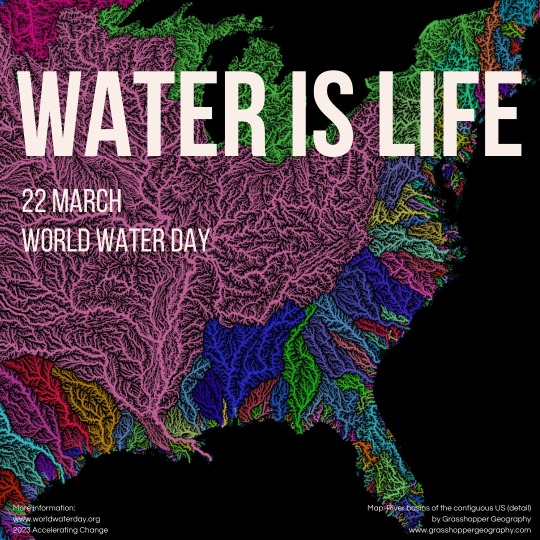
It's World Water Day today!
As we are seriously off-track to meet SDG6, this year is about accelerating change. The more people talk about global issues, the more action will be taken - on personal and on governmental level as well. We decided to contribute to the campaign with some posters you are free (and encouraged!) to share on social media. Give people the chance to talk about the importance of freshwater. You can find more info and all the posters here.
#world water day#world water day 2023#rivermap#river basins#watersheds#maps#maps reimagined#water crisis#sdg6#un water conference
4 notes
·
View notes
Text
World Water Week: Gender inequality and environmental challenges related to water resources and sanitation
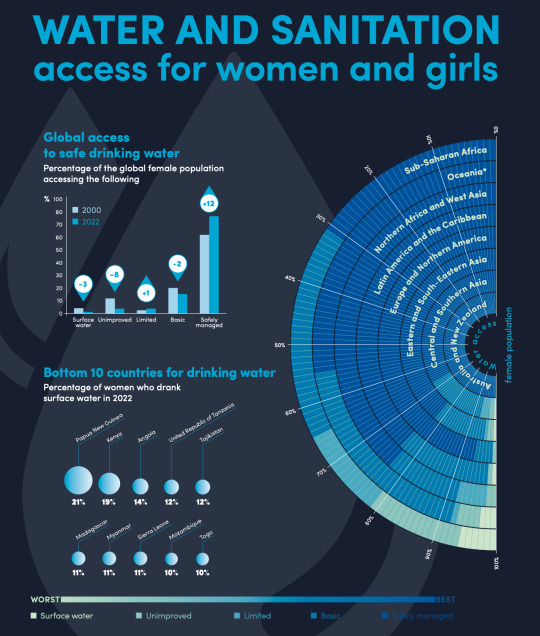
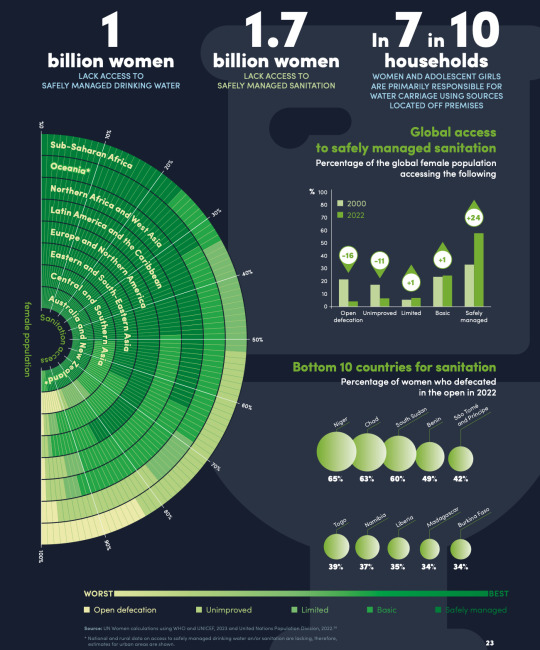
UN Women provided recommendations with focus on addressing various aspects of gender inequality and environmental challenges related to water resources and sanitation. These recommendations include:
Enact Gender-Responsive Legal Frameworks and Institutions for Water Protection:
Implement strong legal frameworks recognizing water resources as entities with independent rights.
Incorporate the "rights of Nature" approach into law to promote harmony with the environment.
Ensure inclusive participation of women, Indigenous groups, and local leaders in natural resource management.
Reverse Unsustainable Consumption Patterns:
Shift consumption patterns, particularly among high consumers, to protect the environment.
Use education, public awareness, policy changes, and global collaboration to promote equitable livelihoods.
Prioritize Women in Climate Change Adaptation and Mitigation:
Include women and vulnerable populations in climate change action plans.
Create gender-responsive activities to address water-related disasters.
Enhance women's capacity for disaster risk reduction.
Address Gender Inequality for Safe Water Access:
Ensure equitable access to safe drinking water and sanitation services.
Reduce the water-collecting burden on women and girls.
Improve access for underserved and marginalized groups.
Promote Women's Participation in Water Governance:
Encourage women's leadership roles in water governance for better management and accessibility.
Prioritize gender-sensitive water infrastructure.
Implement measures like quotas to address gender disparities in leadership.
Include Marginalized Women Activists in Decision-Making:
Integrate perspectives of women activists, especially from marginalized communities, in policies and programs.
Collaborate with citizens, local leaders, and youth for sustainable solutions.
Prioritize Safe Water and Sanitation in Communities:
Ensure safe drinking water, hygiene facilities, and sanitation services in schools and health centers.
Support adolescent girls' needs and maternal health.
Strengthen Partnerships and Funding:
Collaborate across countries and provide financial support to address the water crisis.
Foster cooperation and ecosystem protection.
Invest in Gender-Disaggregated Water Data:
Collect gender-disaggregated data to inform water and sanitation policies.
Monitor progress, reach, and effectiveness of programs, considering marginalized groups.
These recommendations highlight the importance of recognizing water resources as essential and interconnected elements of our ecosystems, and the critical role that gender equality plays in achieving sustainable water management and accessibility.
Read more: https://www.unwomen.org/sites/default/files/2023-07/from-commodity-to-common-good-a-feminist-agenda-to-tackle-the-worlds-water-crisis-en.pdf
0 notes
Text
2nd Meeting, Global Workshop on Droughts in Trans-boundary Basins.
The global workshop will bring together water, agriculture, climate and environment communities as well as drought experts to jointly discuss best practices and lessons learned in addressing droughts in transboundary basins.
#workshops#river basins#best practices#lessons learned#drought#desertification#panel discussion#sdg6#sdg13#Sdg17#sdg2
0 notes
Text
Swiss Focuses on Transboundary Water Management at UN in New York

Focused on SDG 6 and SDG 11
A Swiss delegation is actively participating in the United Nations' 2023 High-level Political Forum on Sustainable Development (HLPF) in New York, held from July 10 to 19.
During this crucial preparatory event for the 2023 Sustainable Development Goals (SDG) Summit in September, Switzerland is placing special emphasis on SDG 6 (clean water and sanitation for all) and SDG 11 (sustainable cities and communities).
Event on Transboundary Water Management for Sustainable Development
As part of its commitment to sustainable development, Switzerland organized an event on transboundary water management on July 12. The event aimed to showcase the power of cooperation in this domain to drive sustainable development and foster peace.
Switzerland has been instrumental in setting up a regional platform in Central Asia to promote political dialogue, better water resource management, and ease tensions between different users at regional and national levels.
Recognized Expertise in Transboundary Water Management
Switzerland, sharing six rivers and four lakes with its neighbors, is internationally recognized for its expertise in transboundary water management. The country initiated the Blue Peace initiative in 2010, combining diplomacy with development cooperation.
Additionally, in 2022, Switzerland played a key role in establishing the Transboundary Water Cooperation Coalition, which includes more than 40 states and non-state actors.
Mid-term Assessment of the 2030 Agenda
The HLPF, organized by the United Nations Economic and Social Council (ECOSOC), serves as a significant milestone in preparation for the 2023 SDG Summit during the UN General Assembly's 78th session.
During this summit, heads of state and governments of all UN member states will adopt a political declaration outlining additional measures to implement the 2030 Agenda. It marks the halfway point in the timeline for achieving the SDGs since their adoption in 2015.
Key Issues in the Political Declaration
At the HLPF, negotiations for the political declaration are already underway, with a focus on increasing investments in the Global South to achieve the SDGs. Switzerland is advocating for a pivotal role for non-state actors from various sectors, including business, science, and civil society, alongside state actors.
Swiss Commitment to Implementing the 2030 Agenda
Markus Reubi, Federal Council delegate for the 2030 Agenda and head of the Swiss delegation to the HLPF, emphasizes Switzerland's dedication to reinvigorating the implementation of the 2030 Agenda.
The 2023 Sustainable Development Report by the UN highlights the need for additional measures to achieve the SDGs fully.
Switzerland has a determination to accelerate progress both at the national and global levels and ensure a just and resilient transition.
The 2030 Agenda for Sustainable Development
The 2030 Agenda encompasses 17 SDGs and 169 targets that address a wide range of challenges, including poverty, education, food security, gender equality, marine resource protection, terrestrial ecosystem preservation, and access to clean energy.
The Federal Council views the 2030 Agenda as the most suitable framework to tackle humanity's common challenges.
As Switzerland continues its efforts at the UN's High-level Political Forum, it remains committed to fostering sustainable development through transboundary water management, investment in the Global South, and collaboration with diverse stakeholders.
The nation is dedicated to achieving the 2030 Agenda, setting a lasting impact on sustainable development and peace globally.
Sources: THX News & Swiss Federal Council.
Read the full article
#2030Agendaimplementation#BluePeaceinitiative#cleanwaterSDG11#NewYorkGlobalsustainablegoals#SDG6#sustainablecitiesHLPF2023#Swissdelegation#Transboundarywatermanagement#UNGeneralAssembly#UNSustainabledevelopment
0 notes